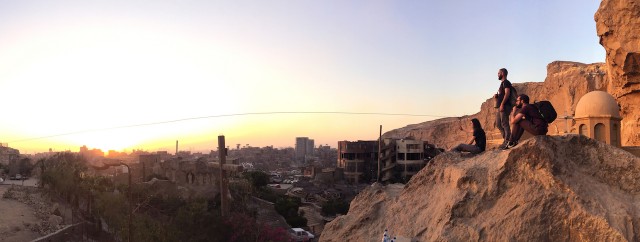At only a little over 3min long, Love, Dad is a gorgeous and heartstring tugging doc/narrative hybrid about the most noble qualities we humans possess, set against some of the most debased conditions. Through uncommon cinematographic beauty, and a commendably minimalist approach to story, director Brandon Bray tells an inspiring tale of a father/daughter relationship, dramatizing a real-life narrative of sacrifice and success.
The film is shot in Manshiyet Nasir, a location of epic poverty near Cairo where over 60% of the city’s waste is processed. 25 years ago something unexpected happened in the midst of this misery, a school started right in the heart of the area. While an opportunity for a leg up, and the potential to break out of a generational cycle of poverty, the proposition of enrolling a child in this school was by no means a simple one for residents. For families barely surviving in “Garbage City”, the loss of a child’s labor had immediate short term consequences. Still, the schools came to thrive, and their founder Maggie Gobran would go on to garner worldwide fame and multiple Nobel Prize nominations for her efforts.
The germ of a story about Garbage City and its schools was developed by The Bittersweet Foundation, a non-profit story shop dedicated to telling ‘counter-narratives’ told from multiple angles. Executive Producer Kate Schmidgall and Managing Director Dave Baker had been going after this specific story for the better part of six years, and brought in Bray to tell a documentary of Gobran’s life and work. Bray decided he wanted to approach things from a different direction though, and, while on the ground at the location, heard the story of a young girl, one of Gobran’s first students in fact, who went on to medical school in Canada. For Bray, the story “exemplified the entire struggle the people of Garbage City face everyday, and the brave parents that took a risk on education.” Thus, Bray decided to refocus the film on dramatizing the efforts of this young woman, and the sacrifice of her father to believe in her and secure the opportunity.
The film, as mentioned, has a documentary feel similar to work from some of the more cinematic practitioners of the craft, such as Variable. As the story quickly advances via wordless montage, only slowly did my understanding that this is not a documentary shift. Even then, I began to worry that the film was a manipulative Public Service Announcement, or a non-profit video, one whose ultimate concern is a donation and doesn’t mind being cynical in utilizing exploitive imagery.
Fortunately Bray’s work avoids these concerns, as the fundamental dignity of his characters shines through and the narrative arc fully sinks in. He tells us that this is the third film he has experimented with blending documentary and narrative together, and in the process he considers 3 “rules”.
1. How can I say this without words?
2. Can I distill these complex issues down to a single character action?
3. Can I do it in 3 min?
Love, Dad is an admirable success on all these counts. While its story arc is simple and manipulative emotionally, it is devastatingly effective, and my cold-hearted cynicism is softened by the story’s factual roots. It is also only 3min, and yet its arc is complete—a feat that most shorts films that are many times longer, fail to achieve.
Indeed, my appreciation of the film is buoyed more by the knowledge of Bray’s framework. Like famous Apple designer Jony Ive says, “To be truly simple, you have to go really deep”. I think adopting these maxims would be a good exercise for many young short filmmakers, as design simplicity enforced by runtime forces an understanding of story form, and demands clarity in plot and character.
I look forward to watching Bray continue to explore in this storytelling vein, but, in the meantime, a new collaboration with Tim Sessler went live last week and received a Vimeo Staff Pick. Called The Light, it is an interesting experimental piece worth your time.

 Jason Sondhi
Jason Sondhi
